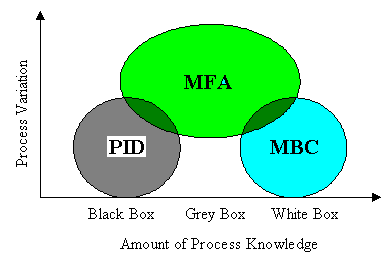|
|
|
|
|
| |
MFA in Control for CyboInverters |
|
| |
|
|
| |
Model-Free Adaptive (MFA) control developed by CyboEnergy’s former parent company, General Cybernation Group Inc (CyboSoft) plays an important role in CyboInverters. |
|
| |
|
|
| |
CyboSoft is recognized as a leader in control technology, particularly for its patented Model-Free Adaptive (MFA) control technologies employed across various industries. CyboSoft's patent, 'Apparatus and Method of Controlling Multi-Input-Single-Output Systems' (US 7,152,052), forms the cornerstone of the technology that drives the innovation in our solar power inverters.
A solar power inverter that features multiple input channels with maximum-power-point-tracking (MPPT) involves significant technical challenges, including complex high-speed multi-input-single-output (MISO) control and optimization under sunlight changes, power requirement variations, and other uncertainties. The design of CyboInverters with multiple input channels stems directly from our deep-rooted expertise in controlling multi-input-single-output systems. |
|
| |
|
|
| |
|
|
| |
|
|
| |
Introduction of Model-Free Adaptive (MFA) Control |
|
| |
|
|
| |
Model-Free Adaptive control, as its name suggests, is an adaptive control method that does not require process models. Based on the “intelligent” nature of artificial neural networks, MFA can adapt to new operating conditions and control complex systems without requiring process models. MFA can control tough processes including nonlinear, open-loop oscillating, and multivariable processes. MFA controllers can also handle processes with large time delays, varying dynamics, and changing operating conditions. Once installed, no controller manual tuning is required. |
|
| |
|
|
| |
 |
|
| |
|
|
| |
Definition of MFA Control |
|
| |
|
|
| |
A Model-Free Adaptive control system is defined to have the following properties:
No precise quantitative knowledge of the process is available;
No process identification mechanism or identifier is included in the system;
No controller design for a specific process is needed;
No manual tuning of controller parameters is required; and
Closed-loop system stability analysis and criteria are available to guarantee the system stability. |
|
| |
|
|
| |
|
|
| |
MFA Controllers at a Glance |
|
| |
|
|
| |
Based on the core MFA technology, a series of MFA controllers have been developed to address specific control problems:
SISO MFA to replace PID and control simple to complex processes,
MIMO MFA to control multivariable processes,
Anti-delay MFA to control processes with large time delays,
Robust MFA to force the process variable to stay within defined bounds,
Feedforward MFA to deal with measurable disturbances,
Nonlinear MFA to control extremely nonlinear processes,
MFA pH controller to control pH processes,
Anti-delay MFA pH controller to control pH processes with large time delays,
Feedforward MFA pH controller for pH processes with large inflow changes,
Time-Varying MFA to control time-varying processes,
Flex-phase MFA to control open-loop oscillating processes,
MFA Optimizer to dynamically search for the min or max condition, and
MFA XRT controller to control exothermal reactor temperature (a run-away process). |
|
| |
|
|
| |
|
|
| |
MFA Control Approach |
|
| |
|
|
| |
The MFA control approach overcomes the major weaknesses of PID and model-based control in the following way:
1. PID is basically a “one algorithm fits all” method. Inevitably, its capability is limited. In other words, PID is more like a general-purpose medicine. Except, there is no way for one medicine to effectively cure all illnesses.
2. Model-based control is more like a “one algorithm fits one system” method. If the process dynamics do not change frequently and the process model can be well maintained, model-based control can provide excellent performance. However, since it is so specialized and has a potentially high installation and maintenance cost, large deployment is difficult.
3. MFA control takes a “one algorithm solves one problem” approach. Each MFA controller is designed to solve a difficult control problem while neither process model nor identification is required. For instance, the Nonlinear MFA controller can control various types of extremely nonlinear processes in different industries and applications. Each MFA controller is like a specifically developed medicine to cure one specific ailment. For the user, it is an effective yet easy to use controller. Therefore, large deployment is more likely. |
|
| |
|
|
| |
|
|
| |
MFA Advantages and Suitability |
|
| |
|
|
| |
Every technology and method has its advantages and suitability. So do PID, Model-based control, and MFA. The following graphic illustrates the suitability of PID, MFA, and Model-based control. PID is a controller for a large variety of processes where no detailed process information is required (Black Box). However, since PID is a fixed controller, it cannot deal with process dynamic changes. Model-based control (MBC) is well suited for controlling a process where detailed knowledge is available (White Box). For instance, when an airplane is designed, its mathematical models can be obtained. So, a perfect control system can be designed using model-based methods to control the airplane. MFA is suitable for controlling processes with qualitative process knowledge but no detailed process models are available (Grey Box). In addition, the process dynamics can have significant variations. Many industrial processes are grey boxes that have frequent load, fuel, and dynamic changes. |
|
| |
|
|
| |

|
|
| |
|
|
| |
For more information about MFA Control, please view the MFA Control Mini Tutorial on the CyboSoft website. |
|
| |
|
|
| |
|
|
|

